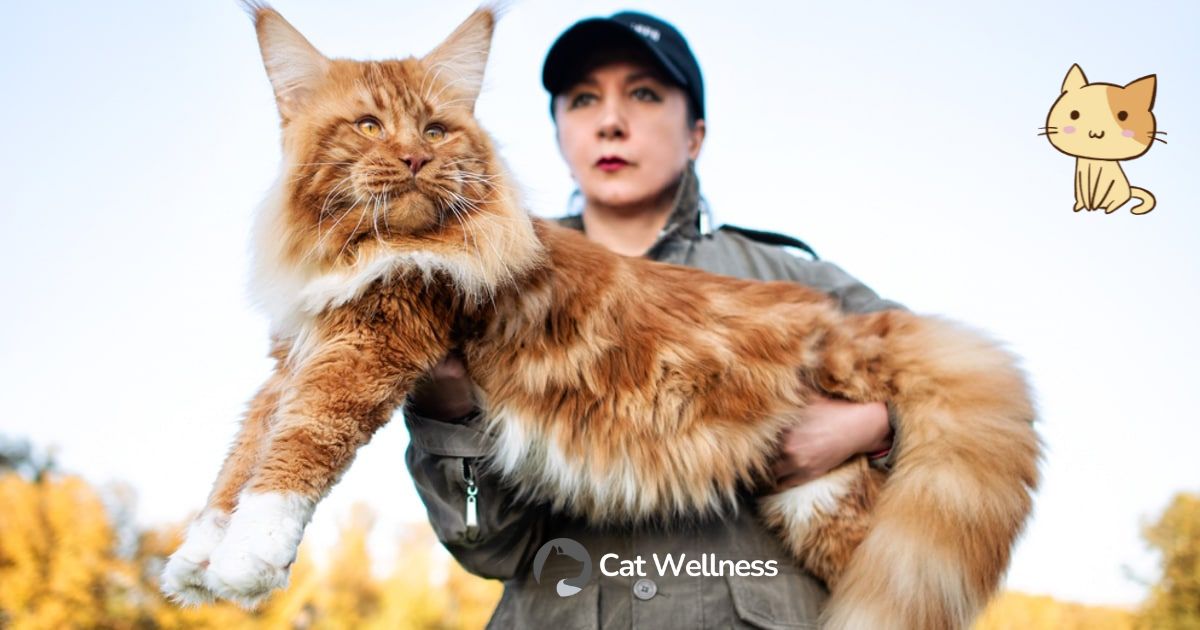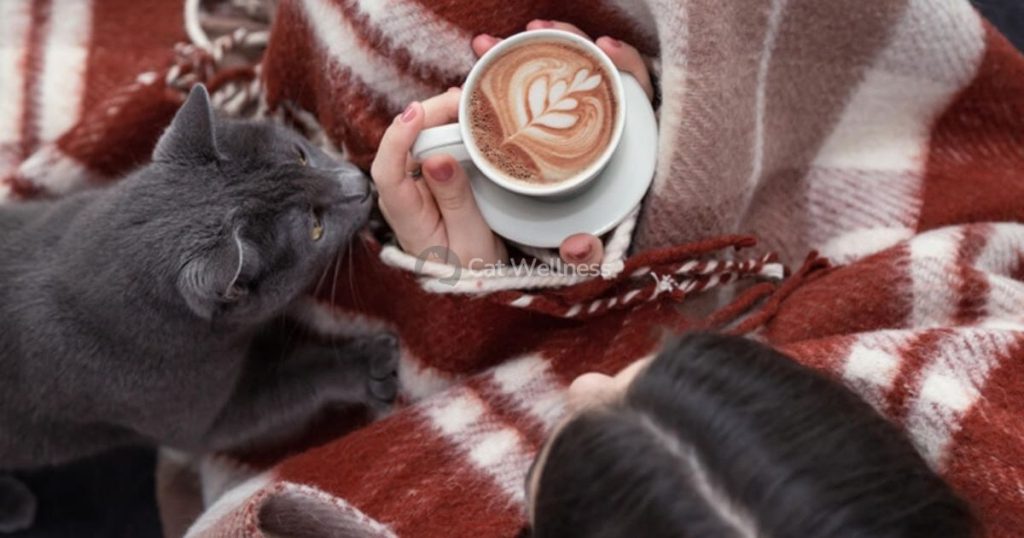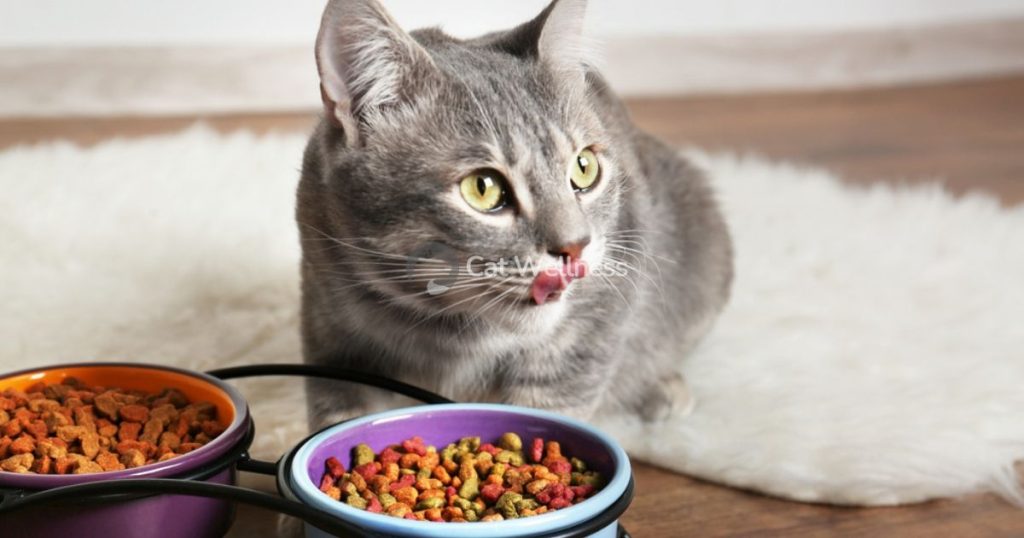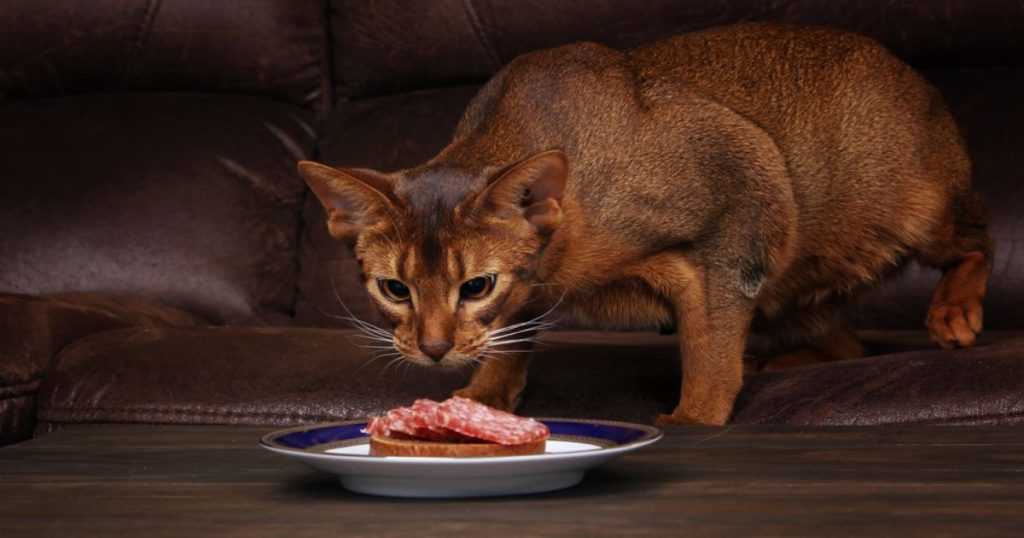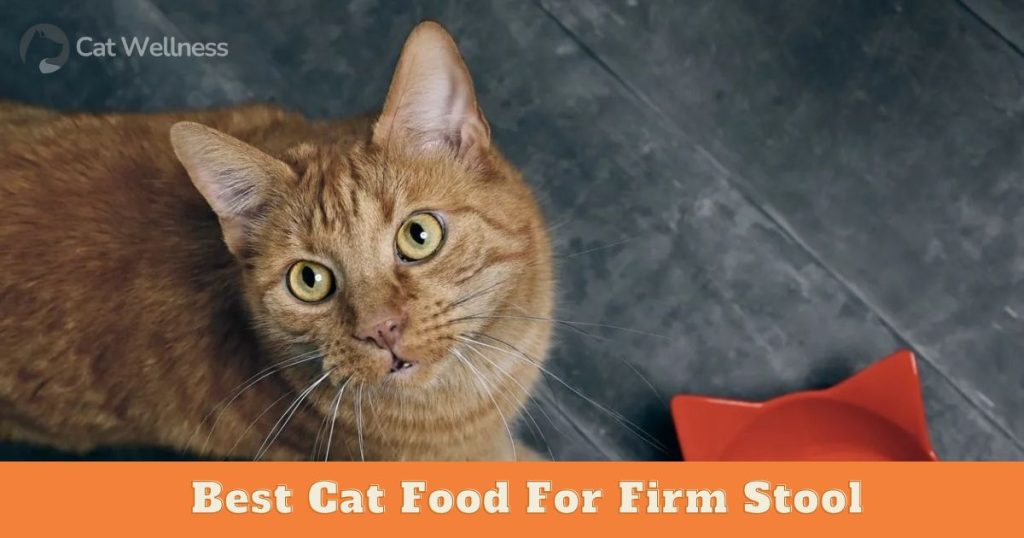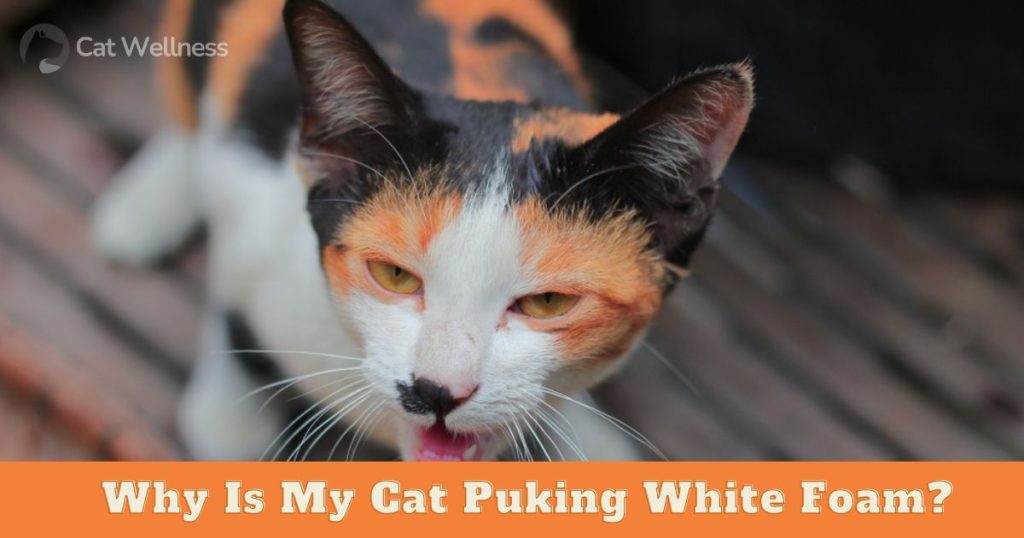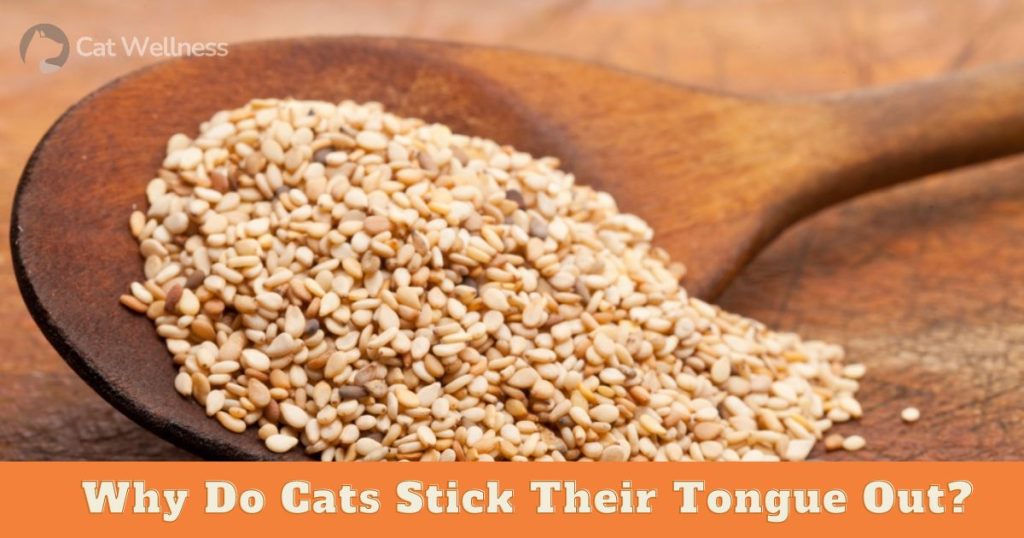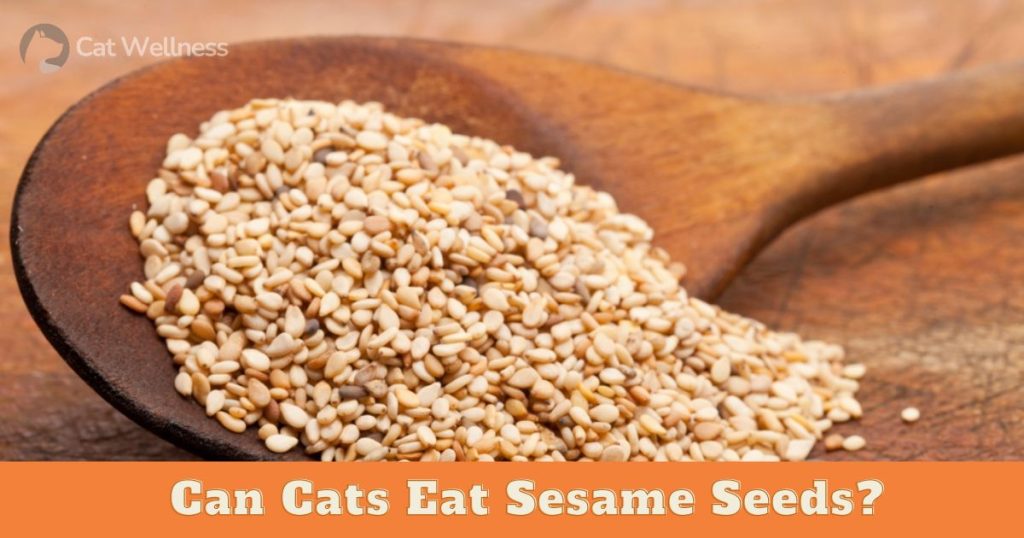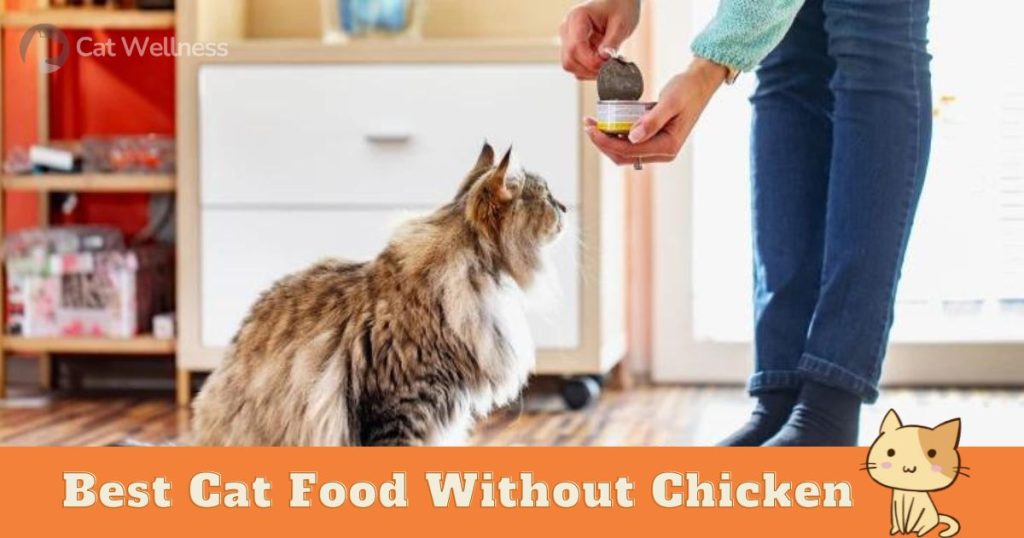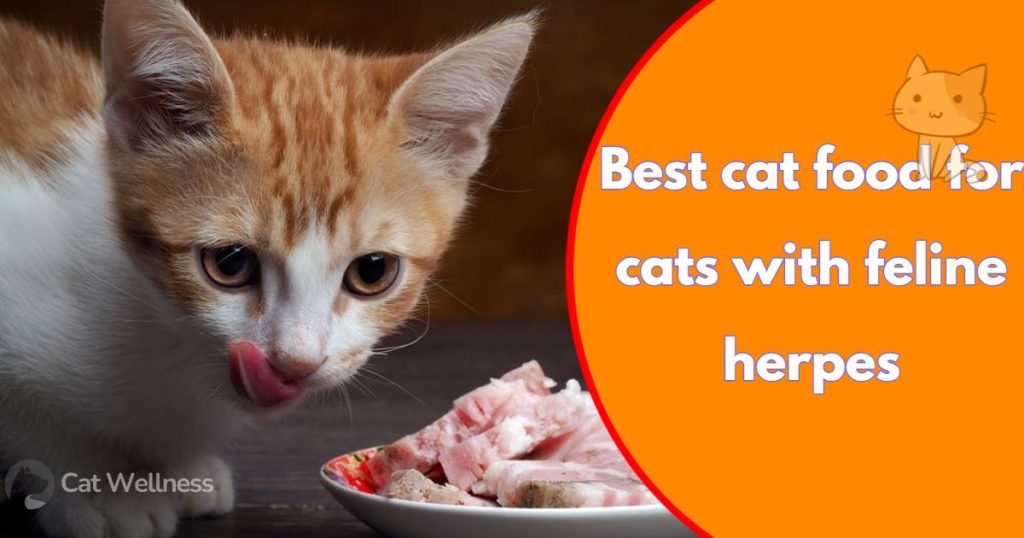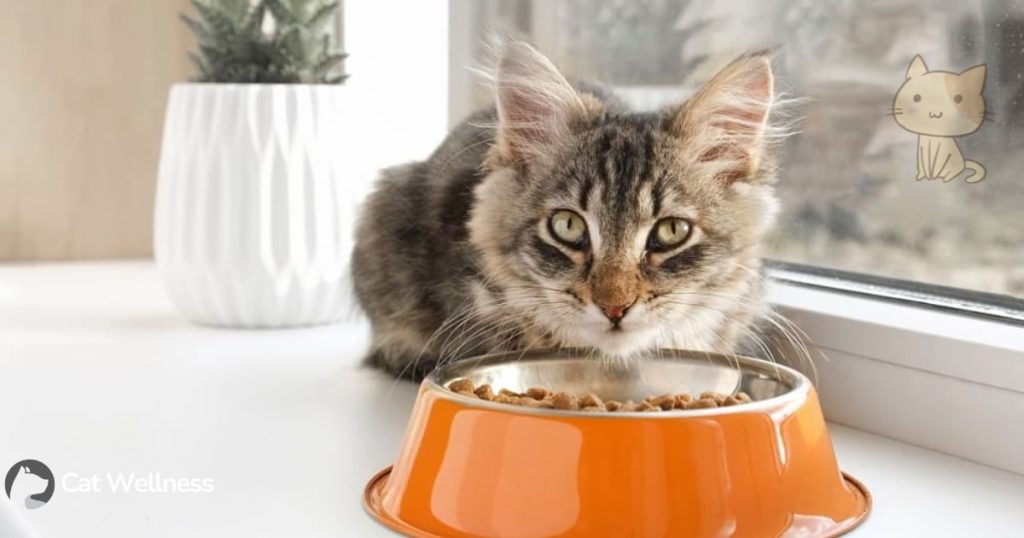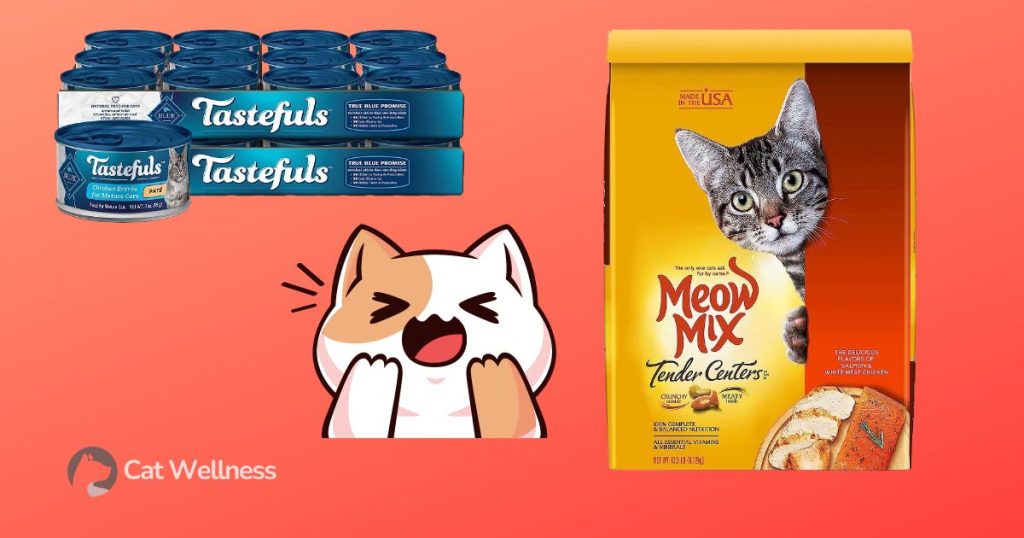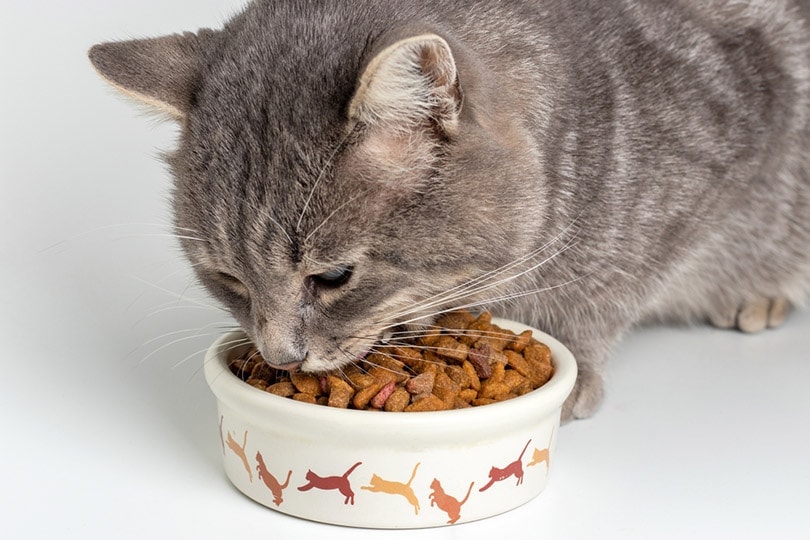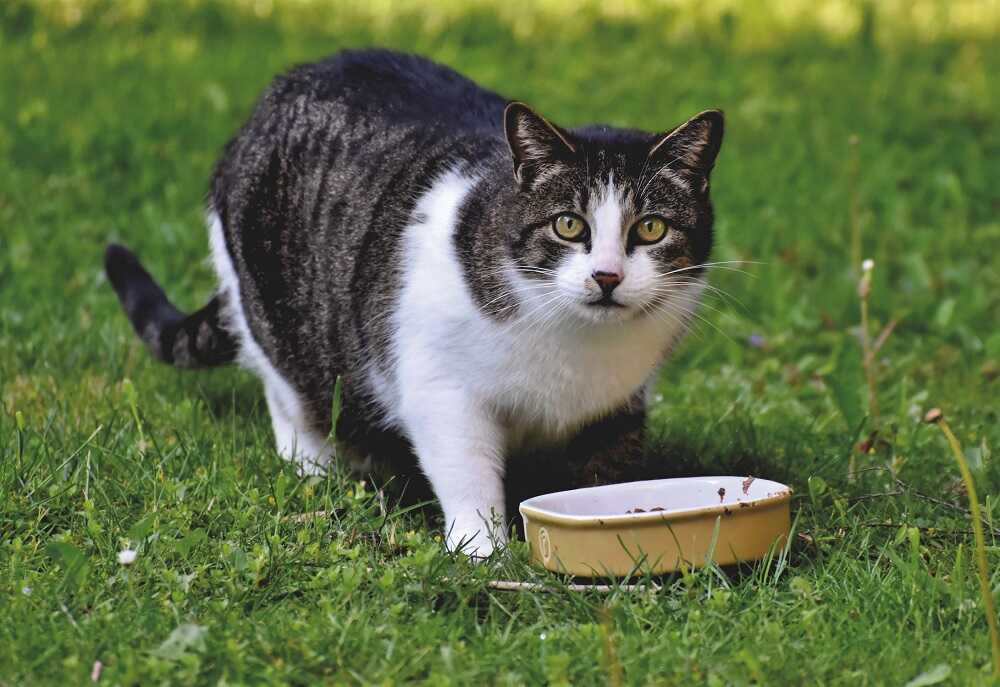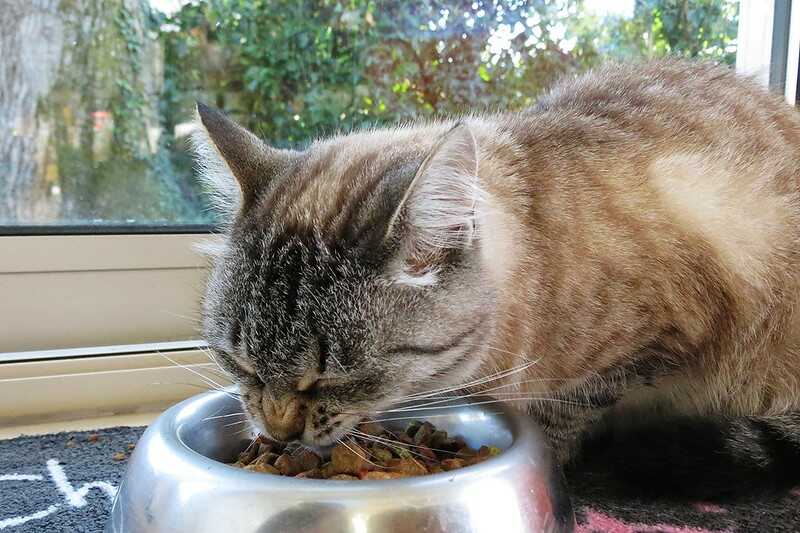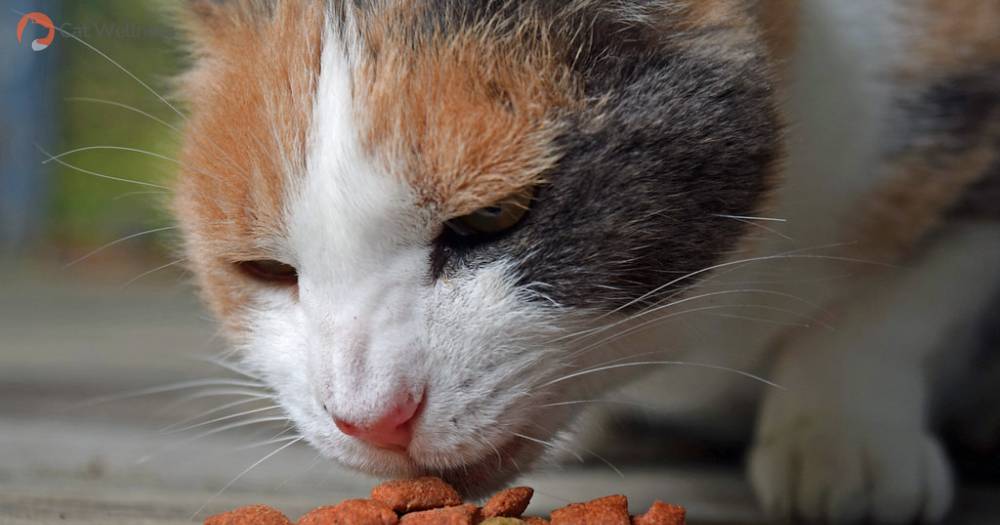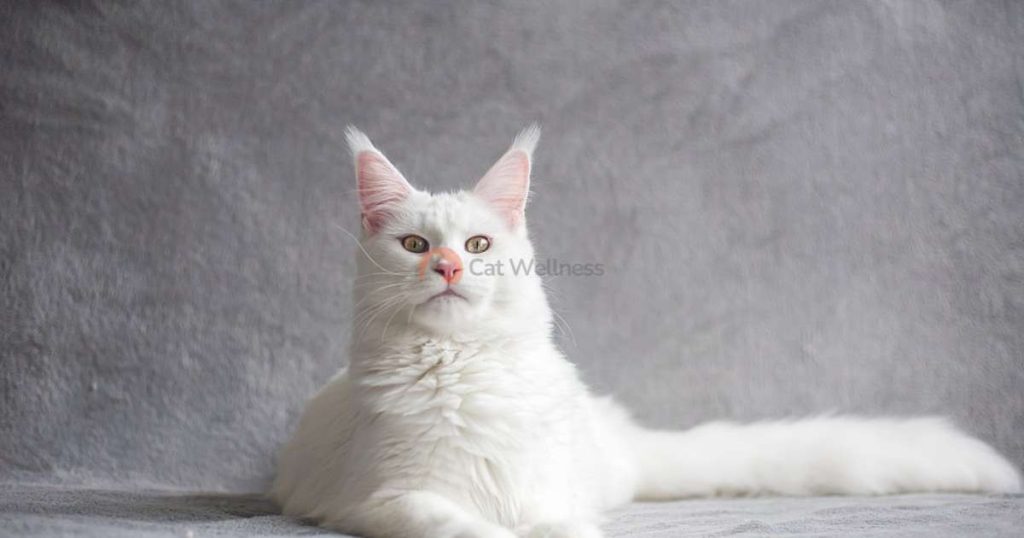Navigating the growth of your Maine Coon can be quite a puzzle. We’ve had our fair share of perplexities with this magnificent breed too, especially considering they can reach weights closing on 25lbs!
Our comprehensive research led us to create an easy-to-understand Maine Coon Size Chart that maps out their unique growth stages.
Join us as we unravel the mystery behind your gentle giant’s development.
Maine Coon Size Chart
The Maine Coon size chart provides a detailed breakdown of the average weights for male and female Maine Coons at different stages of their development, as well as a separate chart for Maine Coon kittens.
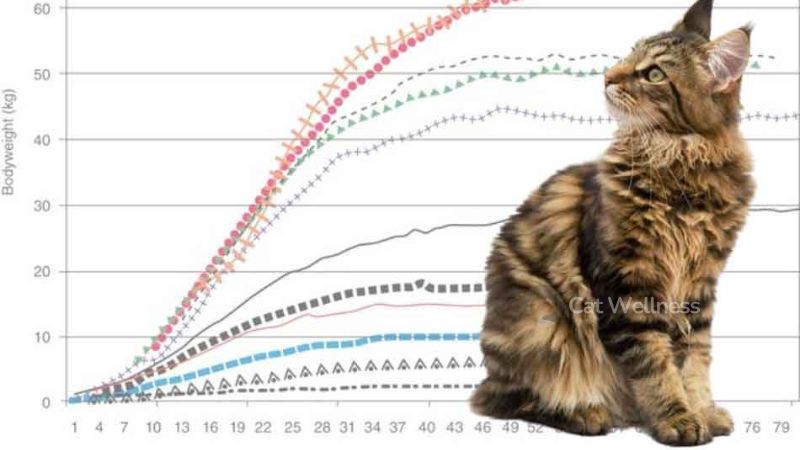
Male Maine Coon Weight Chart
Understanding the growth and weight of your male Maine Coon can help ensure they are healthy and developing appropriately. The table below provides a general weight chart for male Maine Coons, presented in a timeline format.
Age | Average Weight |
1 week | 190 to 290 grams |
1 month | 1 to 1.5 pounds (0.45 to 0.68 kg) |
3 months | 3.3 to 5.5 pounds (1.5 to 2.5 kg) |
6 months | 6.6 to 11 pounds (3 to 5 kg) |
9 months | 9.9 to 16.5 pounds (4.5 to 7.5 kg) |
12 months | 11 to 18 pounds (5 to 8 kg) |
2 years | 15 to 25 pounds (6.8 to 11.3 kg) |
Remember, individual weights can vary, and these figures are averages. Some Maine Coons may weigh more or less due to genetics, diet, and personal growth rates. The important thing is that your Maine Coon continues to grow steadily and stays healthy.
Related Post: Savannah Maine Coon Mix Cats
Female Maine Coon Weight Chart
Comprehending the Average Weight of a Female Maine Coon can help us care for our furry friends better. Here’s a helpful weight chart for you to reference.
Age | Average Weight |
Kitten (0-1 year) | Up to 10 lbs (4.5 kg) |
Young Adult (1-2 years) | 10-15 lbs (4.5-6.8 kg) |
Adult (3-4 years) | 12-20 lbs (5.4-9.1 kg) |
Senior (5+ years) | Weight varies based on health |
Every Maine Coon is unique and factors such as genetics, diet, and overall health can influence their Weight. Use this chart as a guideline, but consult your vet for the most accurate information.
Maine Coon Kitten Size Chart
Here is a general size chart you can refer to for a Maine Coon kitten:
Age | Weight | Size |
1 month | 1-2 lbs | 3-4 inches |
2 months | 2-4 lbs | 4-6 inches |
3 months | 4-6 lbs | 6-9 inches |
6 months | 7-12 lbs | 10-15 inches |
8 months | 9-15 lbs | 15-20 inches |
The Weight of a Maine Coon kitten can vary between 7-12 pounds at five months and 9-15 pounds at eight months.
Factors Affecting Maine Coon Size
Several factors can influence the size of a Maine Coon, including genetics, diet, and slow growth rate.
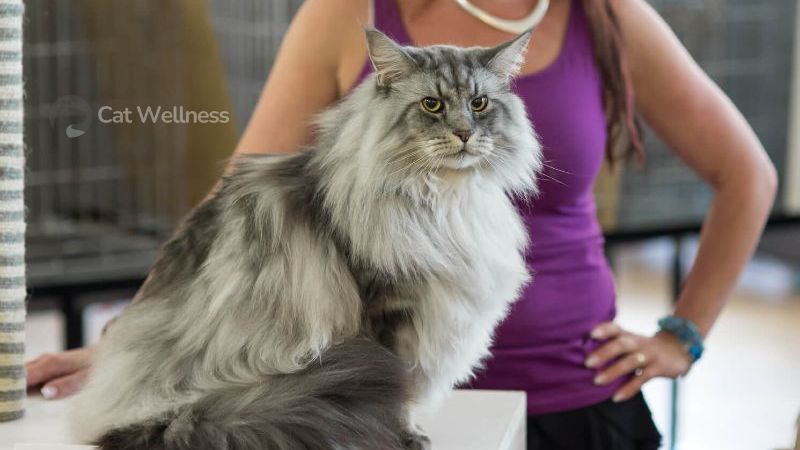
Genetics
Genetics plays a crucial role in determining the size of Maine Coon cats. These magnificent felines have inherited their large size from their ancestors, who were believed to be long-haired cats that arrived in America with European settlers.
The Weight and size of the parents can significantly influence how big a Maine Coon cat gets. Male Maine Coons are generally larger and heavier than females due to hormonal differences.
Additionally, some genetic factors like hypertrophic cardiomyopathy (HCM) may contribute to the larger size of these cats, as increased growth hormone and IGF-1 production can lead to more significant overall growth.
Related Post: Maine Coon Siberian Mix Cats
Diet
Maintaining a balanced and proper diet is crucial for the growth and overall health of your Maine Coon cat.
Their unique dietary needs should be met with a combination of high-quality dry and wet cat food, as well as lean meats like chicken or fish.
Maine Coons have diverse taste preferences, so providing them with different options can help ensure they receive all the necessary nutrients.
It’s essential to avoid overfeeding, as excessive weight gain can lead to health issues in the long run.
Following specific feeding guidelines like those provided by Royal Canin can help you ensure your Maine Coon receives the right amount of food based on size and age.
While exceptional food isn’t necessary, a balanced diet tailored to their nutritional needs will contribute to their optimal growth and development.
Slow Growth Rate
Maine Coon cats are known for their majestic size, but it’s important to note that they have a slower growth rate than other cat breeds. It may take them longer to reach their full size and weight potential.
It’s crucial for pet owners to be patient and not compare their Maine Coon’s growth with other cats. Genetics, nutrition, and overall health play a significant role in determining the growth rate of your furry friend.
You can support their healthy development by providing a balanced diet and ensuring regular veterinary check-ups.
Remember that each Maine Coon is unique, and as long as they’re steadily growing within the average weight range of 9-18 pounds for males (or potentially more) and a length range of 19-30 inches, there’s no need to worry about their slow growth rate.
Debunking Maine Coon Size Myths
Contrary to popular belief, Maine Coons are not descended from raccoons and Marie Antoinette did not own any.
Let’s uncover the truth behind these intriguing myths and learn more about the fascinating history of this majestic breed.
Here are the most outrageous myths about Maine Coon Cats! All of them are fascinating, but number 5 is unexpected! If you love Maine Coons, you’ll love this video!
Outrageous Myths And Misconceptions about Maine Coons
Domestic Cat and Raccoon
Maine Coon cats have long been associated with the myth of being part raccoon. This misconception likely stems from their tufted ears, large size, and bushy tails that may resemble specific characteristics of raccoons.
However, it is essential to note that there is no such breed as a cat-raccoon mix. Cats and raccoons are separate species and cannot produce offspring together. The Maine Coon breed has its distinct origin and is not the result of interbreeding with raccoons.
So when you see your majestic Maine Coon displaying its unique features, remember that it’s all thanks to its genetic makeup as an extraordinary domestic cat!
Marie Antoinette
Marie Antoinette, the iconic Queen of France, is often linked to debunking myths about Maine Coon cats and their size.
Legend has it that as she planned her escape to the United States, Marie Antoinette brought along her beloved feline companions, which included several Maine Coons.
Theories surrounding the Maine Coon’s impressive size have been attributed to this historical association.
One popular myth suggests that Maine Coons bred with bobcats, explaining their gigantic stature and distinctive tufted ears.
Another theory claims that the luxurious tail of a Maine Coon is a result of breeding with Turkish Angora cats owned by Marie Antoinette herself. However, scientific evidence has long dismissed these notions as mere folklore.
It’s essential for pet owners to know that while Maine Coon cats are often referred to as “gorgeous giants,” they are not crossbreeds between raccoons or bobcats and domestic cats.
These beautiful creatures’ unique genetic makeup and distinct traits make them stand out among other cat breeds.
Ship Cats
Ship cats have long been associated with the Maine Coon breed, contributing to the myths surrounding their impressive size.
While it’s true that some ship cats may have mingled their genes with Maine Coons, it’s important to note that not all large cats are necessarily descendants of ship cats.
The Main Coon’s size is primarily determined by genetics, diet, and growth rate rather than specific historical connections.
So if you’re considering getting a Maine Coon for its larger-than-average size, focus more on choosing a reputable breeder who prioritizes responsible breeding practices and proper nutrition for healthy growth rather than romanticizing their potential seafaring lineage.
FAQs
How Big Do Maine Coon Cats Typically Grow?
Maine Coon cats are known for their large size, with males usually weighing between 13 to 18 pounds and females ranging from 8 to 12 pounds. Some exceptional individuals can even reach weights of up to 25 pounds.
At What Age Do Maine Coon Cats Reach Their Full Size?
Maine Coons generally take longer than other breeds to mature in size and appearance entirely. Most Maine Coon cats will reach their full size by the age of three to five years.
What Factors Contribute to A Maine Coon’s Size?
Genetics play a significant role in determining the final size of a Maine Coon cat, as well as nutrition during growth stages.
Early socialization and environmental factors can also influence a cat’s physical development.
Are All Maine Coons Larger than other Domestic Cat Breeds?
While most Maine Coon cats tend to be more extensive compared to the average domestic cat breed, there is still variation within the species itself.
Not every individual will grow into a giant cat, but they are generally more prominent on average when compared to other breeds.
Conclusion
In conclusion, the Maine Coon Size Chart is a valuable tool for pet owners to track and understand their Maine Coon’s growth.
By considering factors such as genetics, diet, and slow growth rate, owners can ensure that their furry friend reaches their optimal size.
Don’t be fooled by myths surrounding this large breed – trust the data from the Maine Coon Size Chart to keep your beloved companion healthy and happy.

